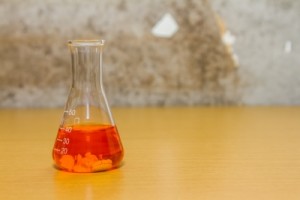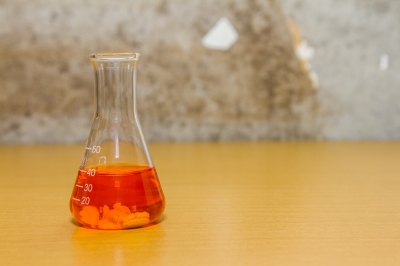 Philippine companies dealing with regulated chemicals may heave a sigh of relief at least for now with the government extending until April 2016 the validity of temporary permits for acquiring substances included in the revised Philippine National Police (PNP) master list of controlled chemicals.
Philippine companies dealing with regulated chemicals may heave a sigh of relief at least for now with the government extending until April 2016 the validity of temporary permits for acquiring substances included in the revised Philippine National Police (PNP) master list of controlled chemicals.
Semiconductor and Electronics Industries in the Philippines, Inc. (SEIPI) president Dr. Danilo Lachica, in a text message to PortCalls, said Interior and Local Government Secretary Mel Senen Sarmiento has agreed to extend the validity of temporary permits beyond October 31, 2015. PNP is under the Department of Interior and Local Government (DILG).
During the 14th SEIPI CEO Forum on October 23, association members aired their concern to President Benigno Aquino III about companies getting into a fix, including shutting down, once their permits expire on October 31.
PNP this year added 41 chemicals to its master list of regulated chemicals, a move it said was in keeping with Presidential Decree No. 1866 as amended by Republic Act Nos. 8294 and 9516.
The decree states that “chemicals and accessories mentioned in the preceding section shall exclusively refer to chlorates, nitrates, nitric acid and such other chemicals and accessories that can be used for the manufacture of explosives and explosive ingredients.”
The legislation is intended to regulate the illegal or unlawful possession, manufacture, dealing in, acquisition or disposition of firearms, ammunition or explosives, or instruments used in the manufacture of firearms, ammunition or explosives.
Consequently, suppliers must now apply for separate licenses and permits to purchase, unload, move and possess such chemicals, and request for plant/factory inspections.
The additional chemicals in the PNP list (for example, sulfuric acid and hydrochloric acid) are, however, commonly used in manufacturing, resulting in enterprises now encountering difficulty securing the needed permits.
Lachica said SEIPI will meet with DILG officials on October 28 to push for amendment of PNP’s master list of controlled chemicals, as well as for a policy of “no escorts and unreceipted fees” and for a commitment to an “improved permit process.”
Repercussions
In a presentation to the Cabinet Economic Cluster on October 16, Lachica said no announcement was made on when and how the PNP list was created, catching stakeholders by surprise when it was published.
“The difficulty in securing the newly required license/permit is causing delay and pending stoppage of the companies’ production,” Lachica said.
He described the process of applying permits as “tedious”, taking more than two months.
Moreover, he noted PNP’s statement that the list of controlled chemicals is an “evolving list,” meaning the agency can add more chemicals to the list anytime it deems necessary.
“The unpredictability of the list could cause additional delays and difficulties to the private sector,” the SEIPI president remarked.
He said industries began experiencing in June the negative impact of the PNP’s enforcement of the expanded controlled-chemicals list.
“In the electronics industry, eight companies reported they were on the brink of line shutdown due to lack of chemical supply. If the temporary permit was not issued, a total of US$21.17 million loss per day would have been incurred and 28,530 employees would have lost their jobs.
“The potential impact based on 2014 industry statistics would be about $74 million/day or P3.4 billion/day, directly affecting some 350,000 direct industry workers,” Lachica said.
The Philippines currently has 101 chemicals whose handling is being controlled. In contrast, China has 71 and Singapore 15. The validity of permits/licenses for these chemicals in the Philippines is as short as two months for some substances and one year for others compared to two years in Singapore, the SEIPI chief pointed out.
Also, the Philippine applicant must physically go to Camp Crame to file the documents, while Singapore only requires the company to log in to the Police Licensing Computerized System.
PNP likewise requires a permit to unload, with a corresponding fee of P0.10 per kilogram or per liter, and an escort fee of P2,500 per movement.
The escort fees can go as high as P2 million a year without any official receipt, Lachica noted, adding that the escort requirement causes delays in the delivery of chemicals due to unavailability of escorts.
In Singapore, the regulating agency requires the driver of the vehicle to undergo training conducted by the Singapore Civil Defence Force. China requires an escort for movements of hazardous chemicals.
Gun ban
Moreover, the gun ban to be adopted by the Commission on Elections (COMELEC) starting on December 15 adds “another layer on top of the PNP regulations” for companies authorized to operate and engage in the manufacture, importation, exportation, purchase, sale, distribution and dealing of firearms and/or its spare parts and/or explosives and/or its components. These companies would therefore need a COMELEC certificate of exemption from the gun ban.
Lachica said securing a seal from COMELEC takes one week and has to be renewed every two weeks. COMELEC uses the PNP list as basis for releasing the seal.
In his Oct 16 presentation, Lachica proposed a one-year moratorium in the implementation of the PNP master list of regulated chemicals to allow stakeholders to adjust while a technical working group is created to deal with issues and formulate implementing rules and regulations.
He also pushed for a one-time exemption from the COMELEC gun ban instead of every two weeks since the PNP already regulates the chemicals and provides escort service.
Lachica proposed automating processes to reduce turnaround time and decentralizing the permitting process “for both the benefit of companies outside Metro Manila and the PNP personnel at Camp Crame.” – Roumina Pablo
Image courtesy of jk1991 at FreeDigitalPhotos.net





